Microsoft CEO Satya Nadella claimed Google fumbled its AI opportunity — but DeepMind is already hiring for a post-AGI future
Google is recruiting for a researcher at DeepMind, potentially indicating the company is ahead in the AI race.

All the latest news, reviews, and guides for Windows and Xbox diehards.
You are now subscribed
Your newsletter sign-up was successful
The generative AI landscape is complicated, especially as it advances and scales to greater heights. It seems that every major AI lab is racing to hit the AGI benchmark, but the vast computing resources needed to get the job done are stunting the process.
We're a long way from the early Bing Chat (now Microsoft Copilot) and ChatGPT hallucination days, with the emergence of reasoning models that simulate human-like characteristics.
Artificial General Intelligence (AGI) is complicated at best, and feels like a term that is haphazardly thrown around. But, at least according to the fine print in the multi-billion-dollar partnership agreement between Microsoft and OpenAI, it's an AI-powered system with the capability to generate up to $100 billion in profit.
Right now, your guess on who will win the AI race could be as good as mine. Anthropic, Google, Microsoft, and OpenAI have achieved great feats in the field, but have equally faced complex challenges, including a lack of capital, scaling laws, regulation, and more.
However, a recent job listing by Google could suggest that the company is well on its way to winning the AI race. Google is already planning for a post-AGI future and is looking to hire a research scientist who specializes in this field to better prepare for what's to come (via 404 Media).
Per Google's job listing, the Post-AGI research scientist's main role at the company will entail:
"Spearhead research projects exploring the influence of AGI on domains such as economics, law, health/wellbeing, AGI to ASI [artificial superintelligence], machine consciousness, and education."
All the latest news, reviews, and guides for Windows and Xbox diehards.
It's speculative, but the job listing could suggest that the company is taking the necessary steps to ensure that it's prepared to take on sophisticated advances as the technology evolves.
Microsoft CEO says Google already missed its AI opportunity.. but did it?
There's been a lot of talk about Google's missed opportunity with AI. In a past interview, Microsoft CEO Satya Nadella seemingly shared the same sentiments, claiming Google had all the potential and resources to become the leader in AI but failed.
The executive's comments seemingly left a bad taste in Google CEO Sundar Pichai's mouth, prompting him to throw lethal jabs at Microsoft's AI efforts:
"I would love to do a side-by-side comparison of Microsoft's own models and our models any day, any time. They're using someone else's models."
But Nadella might have been onto something. A recent report revealed that Google leverages aggressive noncompete clauses to retain AI talent at DeepMind. The report further suggested that the company even offers year-long paid time off (PTO). Perhaps an attempt to maintain a healthy lead in the AI race against its competitors.
Elsewhere, OpenAI CEO Sam Altman has shared some interesting insights about AGI, suggesting that AGI will whoosh by in 5 years with surprisingly little societal impact. On the other hand, Anthropic CEO Dario Amodei predicts AGI will be achieved in 2026 or 2027 based on extrapolated curves of the progression of advanced AI models.

Kevin Okemwa is a seasoned tech journalist based in Nairobi, Kenya with lots of experience covering the latest trends and developments in the industry at Windows Central. With a passion for innovation and a keen eye for detail, he has written for leading publications such as OnMSFT, MakeUseOf, and Windows Report, providing insightful analysis and breaking news on everything revolving around the Microsoft ecosystem. While AFK and not busy following the ever-emerging trends in tech, you can find him exploring the world or listening to music.
You must confirm your public display name before commenting
Please logout and then login again, you will then be prompted to enter your display name.

